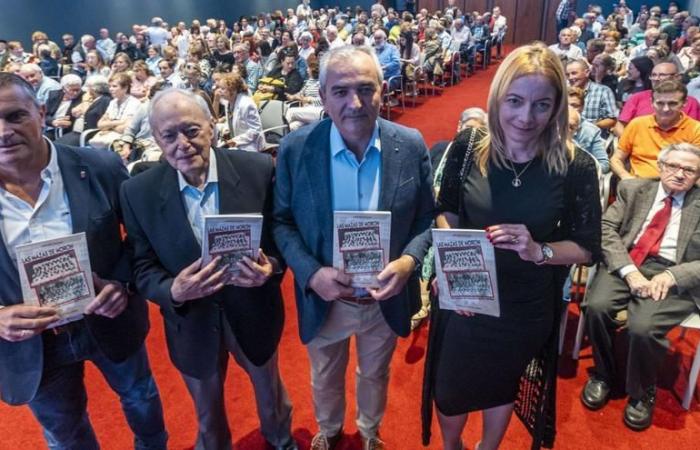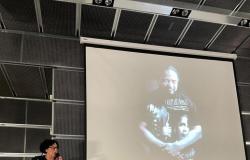
In his book, Fernando Delgado reviews the lives and names of the residents of Las Mazas, in Morcín: “Anonymous people like those from this mining colony made Asturias advance”
In Las Mazas (the only mining colony or colomina, in Morcín), the doors of the houses were always open. That was and continues to be the philosophy of the municipality that yesterday devoted itself to the presentation of the book in which Fernando Delgado, official chronicler of Morcín and collaborator of LA NEW SPAIN, has collected and documented the history and origin of those who inhabited that artificial town that It became a big family. Portal by portal, floor by floor, Delgado traces the memory of all the inhabitants of Las Mazas.
The cover of the book. | line
Many of them and their descendants packed the Club LANueva ESPAÑA yesterday and for a few minutes they returned to that scene of welcome, also witness to dramas, such as that of a miner from Montilla (Córdoba) who died in a firedamp explosion shortly after arriving . But endearing moments also emerged that were created by María Sofía Álvarez, “Esther the portfolio”, Fernando Delgado’s mother, in charge of the Las Mazas postal service from 1961 to 1998.
José Manuel Vaquero, advisor to Prensa Ibérica, prologue of the book, thanked him that moved everyone: “My most heartfelt gratitude to María Sofía, for having been the bearer of the letters that I sent from Bueño to my girlfriend, Amparo Sánchez, today my wife, who lived in Las Mazas,” said José Manuel Vaquero, who barely had time to finish the sentence and received a long ovation. Both María Sofía Álvarez and Amparo Sánchez were in the audience.
“The excited moments we experienced are the result of the effort and love for his land of Fernando, son of the miner Dimas Delgado, and the Foz portfolio. Fernando is an immeasurable correspondent, an example of sensitivity, as 35 years in LA has demonstrated NEW SPAIN”, explained José Manuel Vaquero. The journalist highlighted the initiatives in which Delgado has been involved to place La Foz on the map of regional news. “It has promoted the Brotherhood of La Probe; it has made the magical Monsacro known, through the path of 20,000 steps, and it has led to the candidacy of the Brotherhood and the neighborhood community of La Foz for the award of Exemplary Town of Asturias granted in 2002,” Vaquero stressed.
“As long as there are journalists like Fernando Delgado, the idea that journalism is dead will be fake news,” he said of the municipality’s official chronicler, born in 1963. Delgado was almost born in the colony: “My mother’s water broke and she almost died. birth in Las Mazas”, revealed Delgado, who highlighted the merits of the anonymous heroes of Las Mazas to be protagonists of the book, edited and sponsored by the City Council chaired by Maximino García.
“Anonymous people like this are the ones who advance Asturias and Spain,” stressed the author, also visibly moved, especially when remembering Marisa López Goyanes, who died on May 22 and had a special interest in seeing the book in her hands.
“Marisa was part of the teams that worked on this giant puzzle that we had to put together. She saw the cover but did not know the final result,” said Fernando Delgado, who also appears in the book in a photo of a child with his mother. “She instilled in me the values of respect for all people, especially the humble and hard-working ones,” he said. “I consider myself privileged because thanks to the work and effort of my parents, I was able, like many of my generation, to have a better life than those who came to work in the mines, exemplary people who make up the true intrahistory of the peoples and countries,” Delgado said.
In an afternoon of surprises, one more awaited: the writer’s public greeting to his wife, Belén Valdés from Rio de Janeiro, whom he married 24 years ago yesterday. “She gives me the space to do all these things,” he remarked.
Maximino García, mayor of Morcín, and Noelia Pereira, Councilor for Culture, highlighted the research carried out by Delgado to identify hundreds of families from Andalusia, Galicia, Extremadura, Castilla y León, Cantabria, Madrid, Castilla La Mancha, Valencian Community, Catalonia, Basque Country, Melilla, Asturias, Portugal, Argentina, Cuba, Romania, Slovakia and Morocco, who inhabited the artificial town built in the mid-50s of the 20th century. In total 1,614 people identified and integrated into 340 families.





